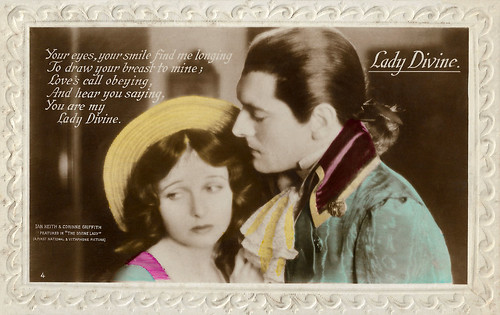
British postcard by Max Kracke & Co, London, in the Talkie Song Series, no. 4. Photo: First National. Corinne Griffith and Ian Keith in The Divine Lady (Frank Lloyd, 1929). Caption: Lady Divine. Your eyes, your smile find me longing, To draw your breast to mine; Love's call obeying, And hear you saying, You are my Lady Divine.
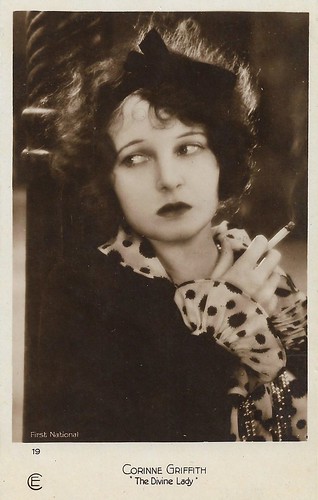
French postcard by Editions Cinémagazine, no. 19. Photo: First National. Corinne Griffith in The Divine Lady (1929).
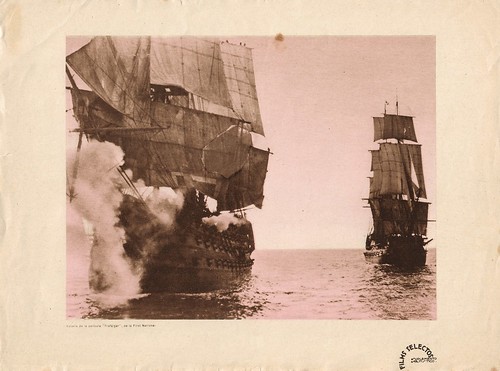
Spanish leaflet, supplement to Spanish film journal Films Selectos, showing the Battle of Trafalgar in the First National production The Divine Lady (Frank Lloyd, 1929).
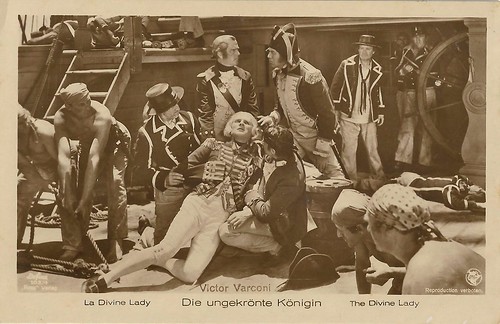
German postcard by Ross Verlag, no. 103/4. Photo: Defina / First National. Victor Varconi as Horatio Nelson in The Divine Lady (Frank Lloyd, 1929). The death of Nelson during the Battle of Trafalgar.
A historical mix of love, war, and social differences
In the American Vitaphone sound film The Divine Lady (Frank Lloyd, 1929), Corinne Griffith plays the elading role of Emma Hart, the beautiful daughter of a cook (Marie Dressler) who works for the actor George Romney (William Conklin).
Emma is friends with Charles Greville (Ian Keith), but later she marries Charles' uncle, Lord William Hamilton (H.B. Warner), the British ambassador to the court of the Kingdom of Naples. Despite the age difference and their different social backgrounds, the couple is happy. Emma even becomes a confidante of the Queen of Naples (Dorothy Cumming).
Years later, Emma meets the English captain Horatio Nelson (Victor Varconi). England is at war with France. Nelson, commander of an English warship, is able to bunker important supplies and water in Naples thanks to Emma. The two fall in love.
Nelson's victories over the French fleet and Emma's influence at the court of Naples are closely watched in London. Eventually, the lovers are summoned to London, where they are greeted enthusiastically by the crowds. But the higher society rejects Emma. Her husband also avoids her. When Emma is refused an invitation to a royal celebration in honor of the captain, Nelson leaves his wife Fanny and retreats with Emma to his country estate. For a time, both are happy there, but Nelson is soon entrusted with another fleet mission. Again he wins victories over the French fleet. At the Battle of Trafalgar, Nelson is mortally wounded. He dies surrounded by his crew, his last thoughts are of Emma.
The Divine Lady (Frank Lloyd, 1929) was adapted by Harry Carr, Forrest Halsey, Agnes Christine Johnston, and Edwin Justus Mayer from the novel 'The Divine Lady: A Romance of Nelson and Emma Hamilton' by E. Barrington. The novel was based on the lives of Lord Horatio Nelson (1758-1805) and Lady Emma Hamilton (1765-1815). Their love affair, while both were married to others, shocked English society at the time. After Nelson's death at the Battle of Trafalgar, Lady Hamilton faded into obscurity and died in poverty. The fact that the couple had a daughter named Horatia is not mentioned in the film. The couple's love story also inspired many other films.
The Divine Lady was filmed silently, but with all sound recorded separately and added in post-production - the music, singing, and sound effects, but no spoken dialogue. Filmed in 1928, most studios and cinemas were still in transition to the new sound-on-film technology. First National released the film in 1929 in both a silent and a sound version. The sound version featured the theme song 'Lady Divine', with lyrics by Richard Kountz and music by Nathaniel Shilkret, which became a popular hit in 1929 and was recorded by numerous artists.
In 1930, Frank Lloyd received the Oscar for Best Direction for The Divine Lady, while Corinne Griffith was nominated for Best Actress in a leading role and John F. Seitz for Best Cinematography.
The Divine Lady has survived intact along with its Vitaphone soundtrack, thanks to a joint preservation project of the UCLA Film and Television Archive and the Museum of Modern Art Department of Film in cooperation with the Czechoslovak Film Archive. It was restored in conjunction with the project American Moviemakers: The Dawn of Sound. In 2009, the film was released on DVD by the Warner Archive Collection.
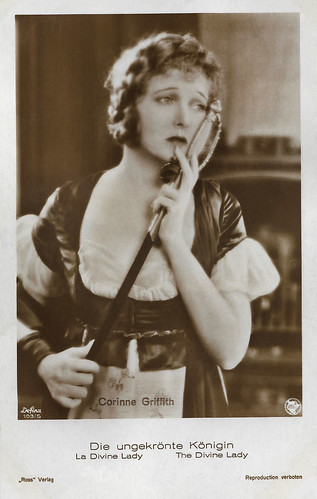
German postcard by Ross Verlag, no. 103/5, 1928-1929. Photo: Defina / First National. Corinne Griffith in The Divine Lady (Frank Lloyd, 1929).
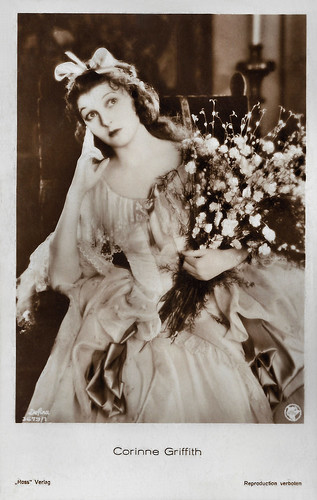
German postcard by Ross Verlag, no. 3679/1, 1928-1929. Photo: Defina / First National. Corinne Griffith in The Divine Lady (Frank Lloyd, 1929).

German postcard by Ross Verlag, no. 3679/2, 1928-1929. Photo: Defina / First National. Corinne Griffith in The Divine Lady (Frank Lloyd, 1929).
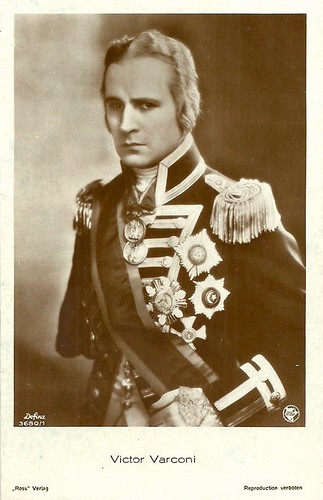
German postcard by Ross Verlag, no. 3680/1. Photo: Defina / First National. Victor Varconi in The Divine Lady (Frank Lloyd, 1929) as Horatio Nelson, here already without his right arm which Nelson had lost in 1797 at the Battle at Santa Cruz de Tenerife.
Sources: Wikipedia and IMDb.
No comments:
Post a Comment